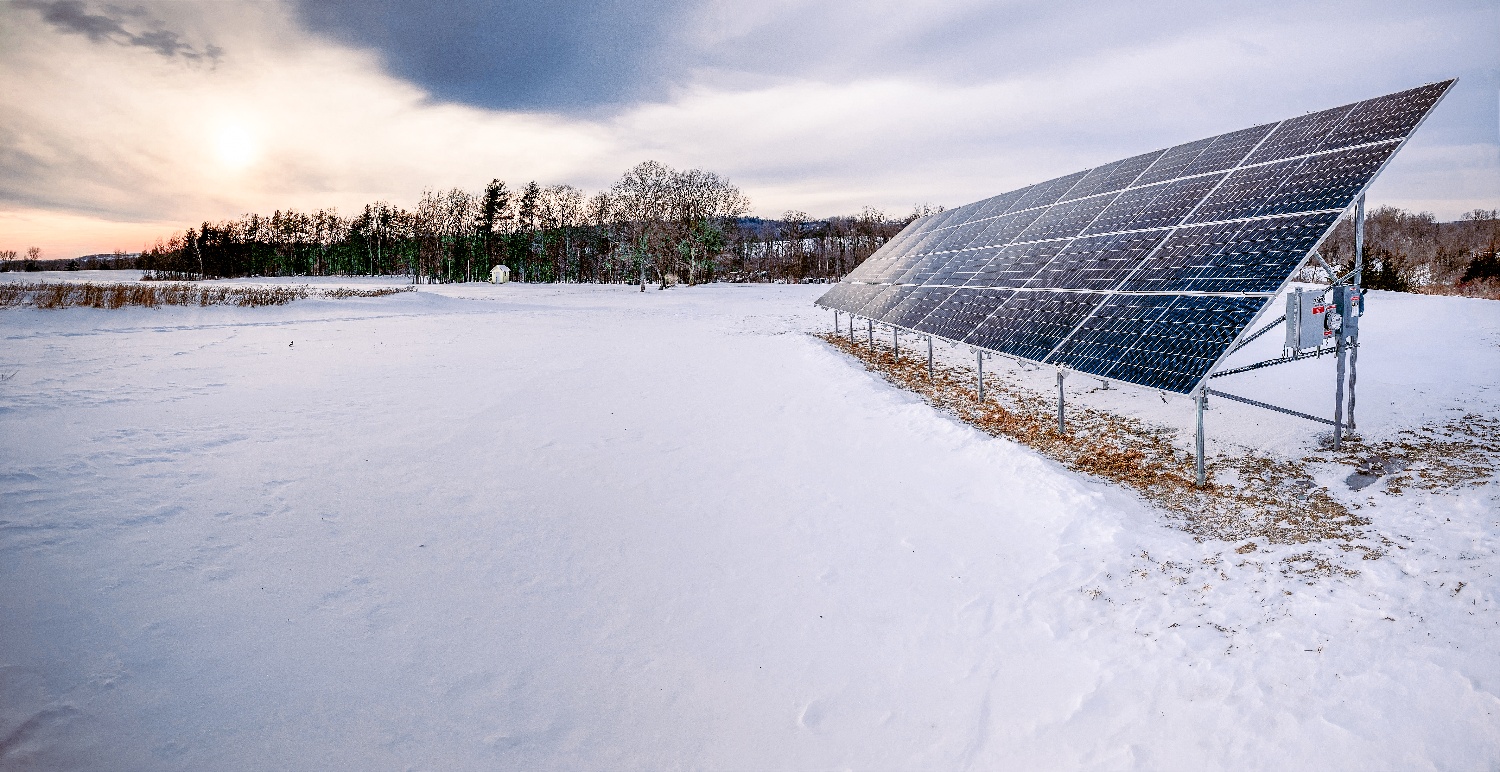Two Green Mountain Solar experts talk about common off-grid solar misconceptions and why grid-tied is usually the better way to go.
Many people think they want off-grid, only to realize that cord-cutting reality isn’t close to what they expected. Ben McFeeters, Field Supervisor, and Marcus Shapiro, Senior Solar Advisor, answer some common questions about going off-grid with solar and why, for the vast majority of folks, grid-tied solar is the way to go.
What does it mean to be off-grid?
Marcus: Off-grid is cutting your ties with the utility. You have to be entirely self-reliant without the comfort of the grid for backup. Grid-tied (or on-grid) means that your home runs on solar when it’s available but you can tap into the grid whenever the sun isn’t shining (like at night or during bad weather).
What does a complete off-grid system look like?
Marcus: For people looking into off-grid, they need to really be sizing their solar and battery systems for the absolute worst-case scenario. They need to be confident that they have enough battery power and solar to get them through multiple days of darkness and snow cover in the middle of winter. And almost all off-grid systems also need to have generators, whether it's a whole home generator, usually, or even just a plug-in generator. I know plenty of people who live off-grid and just live with running their generator for many months in the winter.
What does it take to go off-grid in Vermont?
Ben: You have to be really aware of the energy that you use and how much energy the appliances are consuming. A coffeemaker is like 900 Watts, and a hairdryer or an air conditioner is even more— all these things take a lot of power. Off-grid also means not using as much power when there's not as much sun available, like on a cloudy day, snowy day. You might also have to clean the snow off your panels (which is not something we recommend the typical homeowner do), which is why you’d want to do ground arrays for these types of installations.
Marcus: It is an entire lifestyle change. It is not for the average person and does not afford many of the comforts that grid-tied homeowners are used to.
Why do people go off-grid?
Marcus: We often get people reaching out who are new homeowners or building a new home in the middle of nowhere and they got a ridiculous quote from the utility to bring power up to their house. Just to throw some numbers out there, if a potential customer says, “Oh, they said, it's going to be $40,000 to $60,000 to bring grid power to my house,” my reaction is: “That's how much your batteries are going to cost before we even look into the solar side of things.” To size them a system to be able to live with the comfort of a grid-tied home is ridiculously expensive.
Related: How Do I Pay for Solar Panels?
Why is off-grid so expensive?
Marcus: You need to size your battery for like three to five days of backup, assuming no input from the solar at all and still have a generator backup. There’s also the reliability of all the technology to consider. You’d want to invest in quality materials because you don’t have the safety net of the grid for power.
It sounds like you’re basically building your own mini utility.
Ben: That’s right. And the person installing it is responsible for when things go wrong. If your transformer burns up when you’re grid-tied, you call the utility, they come out and fix it any hour of the day or night, during a storm, whatever. Some people go the DIY route, but then they are responsible if things don’t work. I’ve installed off-grid before and you’ve got to pick a product that you know is going to last because I don't want to get phone calls at midnight saying, ‘my power's out.’
How can folks increase their energy independence without breaking the bank of going off-grid?
Marcus: Your standard home can be very grid-independent with two or three Tesla Powerwall batteries and a grid-tied solar system. With a properly sized grid-tied solar system and basic battery backup, you could run basically off-grid for seven to eight months of the year with really no issues. It's just during the winter months that you’d be tapping into the grid. Fortunately, with net metering, a properly sized system will offset the cost of your electricity usage with your power generation in the summer. Tesla even has a new feature in their app called “off-grid mode”. So from your phone, you can hit a button that says “off-grid” and it cuts your ties with the utility.
Must Read: How to Use Solar Backup Battery in Vermont
Ben: At my house, I could technically go off-grid right now. Just flip the switch, and I could disconnect completely. And I could run that during this spring, summer, fall, I could do that completely. The energy independence you get with modern batteries—even with a grid-tied system—is pretty incredible.
—Julia Westbrook
Read on!
Vermont Utility Battery Programs
Battery Backup for Solar Panels: What to Know
Will Solar Panels Work During a Power Outage?

Leave a Comment